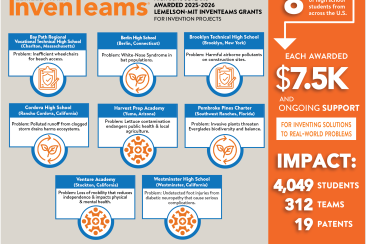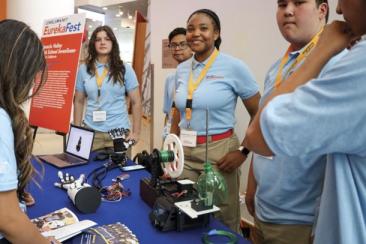Collegiate Prize Expanded to Honor Inventive Students Nationwide

The prestigious Collegiate Student Prize program has been extended to include the most inventive undergraduate and graduate students nationwide.
CAMBRIDGE, Mass. (September 18, 2013) – The Lemelson-MIT Program today announced the expansion of its prestigious Collegiate Student Prize program to the Lemelson-MIT National Collegiate Student Prize Competition, a nationwide search for the most inventive undergraduate and graduate students. The Lemelson-MIT Program will award $50,000 in prizes this year, with winning undergraduate teams receiving $10,000 in two categories and graduate student winners receiving $15,000 in two categories.
The national prize builds on the legacy of the Lemelson-MIT Collegiate Student Prize, which has served as a springboard for collegiate inventors for nearly twenty years. The Lemelson-MIT Program has awarded a student prize at MIT since 1994 and additional prizes in collaboration with Rensselaer Polytechnic Institute and the University of Illinois at Urbana-Champaign since 2007 and the California Institute of Technology from 2009-2011.
“Building and upholding excitement around invention at the undergraduate and graduate levels is critically important. Inventors who can think globally and create technologies to solve problems anywhere in the world are key to the competitiveness of the US economy,” said Joshua Schuler, executive director of the Lemelson-MIT Program. “We are excited to leverage our experience awarding the student prize at MIT and select partner schools to recognize students across the country who are reimagining a better tomorrow through invention.”
Prize Categories
The National Collegiate Student Prize Competition, supported by The Lemelson Foundation, is open to teams of undergraduate students and individual graduate students enrolled at U.S. institutions. Applicants can submit their inventions in two categories:
The “Cure it!” Lemelson-MIT Student Prize
“Cure it!” will reward students working on technology-based inventions that can improve healthcare
The “Use it!” Lemelson-MIT Student Prize
“Use it!” will reward students working on technology-based inventions that can improve consumer devices and tools
Inventions can address opportunities in both developed and developing economies.
Judging Criteria
Applicants will be evaluated by category-specific screening groups and a prestigious national jury, the same jury that selects the winner of the annual $500,000 Lemelson-MIT Prize, on a range of criteria including portfolio of inventions for graduate student entrants and a single invention for undergraduate teams; potential for commercialization of inventions and demonstrated youth leadership and mentorship. The deadline to apply is December 31, 2013. Winners will be selected in April 2014.
“My husband, Jerry, believed that we needed to invest in the ingenuity and inventiveness of our country's youth to expand our economy and maintain our economic competitiveness in a constantly changing world," said Dorothy Lemelson, Chair of The Lemelson Foundation. "We established the Lemelson-MIT Student Prize to inspire and showcase collegiate student inventors. Over the past 19 plus years, I have marveled at the breadth of vision and creativity of each student prize winner, as well as the applicants. The new Lemelson-MIT National Collegiate Student Prize Competition will allow us to shine an even brighter light on some of the greatest and most inventive young people in our nation."
Past winners include Carl Dietrich, founder of Terrafugia and inventor of the Transition, a street-legal airplane that has been internationally heralded as the “first practical flying car;” and Nate Ball, host of PBS Kids show Design Squad Nation, inventor of the ATLAS Powered Rope for emergency responders and soldiers, and founder of Atlas Devices.
Call for Sponsors
The Lemelson-MIT Program will expand the competition to additional categories in future years. The organization is seeking partners with interest in sponsoring the “Cure it!” and “Use it!” categories, in addition to supporting the execution and scaling of the National Collegiate Student Prize Competition. Future categories could include “Drive it!” for students reimagining transportation; “Eat it!” for students reimagining food and agriculture; “Wear it!” for students inventing the next generation of wearable consumer products; and “Network it!” for students reimagining how products and services are delivered through web-based networks.





